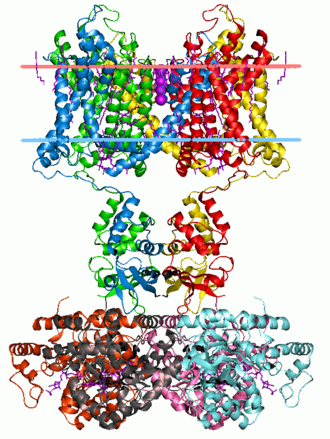Membrane protein

Crystal structure of Potassium channel Kv1.2/2.1 Chimera. Calculated hydrocarbon boundaries of the lipid bilayer are indicated by red and blue dots.
A membrane protein is a protein molecule that is attached to, or associated with the membrane of a cell or an organelle.
20–30% of all genes in genomes code for membrane proteins.[1] They are targets of over 50% of all modern medicinal drugs.[2]
Function
Membrane proteins perform a variety of functions vital to the survival of organisms:[3]
- Membrane receptor proteins relay signals between the cell's internal and external environments.
- Membrane transport proteins move molecules and ions across the membrane.
- Membrane enzymes have many activities.
- Cell adhesion molecules allow cells to identify each other and interact. For example, proteins involved in immune response.
Membrane Protein Media
Membrane protein complexes of photosynthesis in the thylakoid membrane
Schematic representation of transmembrane proteins: 1. a single transmembrane α-helix (bitopic membrane protein) 2. a polytopic transmembrane α-helical protein 3. a polytopic transmembrane β-sheet protein The membrane is represented in light-brown.
Related pages
References
- ↑ Krogh A. et al 2001. Predicting transmembrane protein topology with a hidden markov model: application to complete genomes. Journal of Molecular Biology 305 (3): 567–580. [1]
- ↑ Lua error in Module:Citation/CS1/Identifiers at line 630: attempt to index field 'known_free_doi_registrants_t' (a nil value).
- ↑ Almén M. et al 2009. Mapping the human membrane proteome: a majority of the human membrane proteins can be classified according to function and evolutionary origin. BMC Biology 7: 50. [2]
Other websites
- General principles of membrane protein folding and stability Archived 2011-01-11 at the Wayback Machine from Stephen White laboratory
- Orientations of proteins in membranes (OPM) database 3D structures of integral and amphitropic membrane proteins

